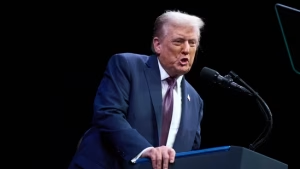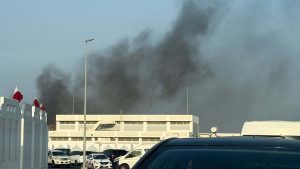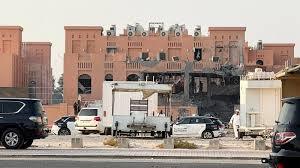Multiple explosions known as the Doha blasts struck Qatar’s capital on Tuesday, September 9, 2025, in what appears to be a targeted Israeli attack on senior Hamas leadership. The Doha blasts occurred while top Palestinian officials were present in the Gulf nation for crucial ceasefire discussions, dramatically escalating tensions in an already volatile Middle East situation.
The Doha blasts have sent shockwaves through the international community, particularly as Qatar has long served as a neutral mediator between Hamas and Israel. The timing of these explosions, coinciding with active peace negotiations, raises serious questions about the future of diplomatic efforts to resolve the ongoing Gaza conflict.
Trump Administration’s Alleged Green Light for Operation

Israeli sources report that President Donald Trump provided authorization for the military operation that resulted in the Doha blasts. An Israeli news channel, citing unnamed officials, claimed Trump “gave the green light” to Benjamin Netanyahu’s government for the attack on Hamas leadership in Qatar’s capital.
However, Israeli Prime Minister Benjamin Netanyahu took full responsibility for the operation on social media platform X, stating: “Israel initiated it, Israel carried it out and Israel takes full responsibility.” This statement followed reports linking the Doha blasts to direct American approval, suggesting complex diplomatic coordination behind the military action.
The alleged Trump administration involvement in authorizing the Doha blasts represents a significant escalation in U.S. engagement with Middle East military operations, potentially affecting future peace negotiations and regional stability.
Hamas Leadership Targeted During Peace Discussions
The Doha blasts specifically targeted senior Hamas officials who had gathered in Qatar’s capital to discuss Trump’s recent ceasefire proposal. The Palestinian negotiating delegation was actively examining the American president’s plan for ending hostilities in Gaza and securing hostage releases when the explosions occurred.
Key Hamas leaders reportedly affected by the Doha blasts include Khalil al-Hayya and Zaher Jabarin, both serving among the five most senior Palestinian officials currently heading the organization. These leaders form part of Hamas’s collective leadership alongside Khaled Mashal and Muhammad Ismail Darwish, following Yahya Sinwar’s death in Israeli operations last year.
The targeting of these specific individuals during the Doha blasts demonstrates Israeli intelligence capabilities and strategic planning, as these leaders have been instrumental in managing Hamas operations and war efforts against Israel since the October 7 attacks.
Qatar’s Role as Mediator Under Threat
The Doha blasts have severely compromised Qatar’s position as a neutral mediator in Hamas-Israel negotiations. The Gulf nation has hosted Hamas’s exiled leadership for years and facilitated diplomatic discussions between the parties, even before the current Gaza conflict escalated.
Qatar’s foreign ministry spokesman Majed al-Ansari condemned the Doha blasts as a “cowardly” attack and “flagrant violation of all international laws and norms.” This strong diplomatic response reflects Qatar’s concern about the precedent set by attacking diplomatic personnel and negotiators on its sovereign territory.
Also Read: Peter Navarro Blasts BRICS Nations as ‘Vampires’ in Shocking Attack
The Doha blasts occurred at Qatar’s Al-Udeid Air Base area, which houses U.S. military facilities, adding another layer of complexity to the international implications. This location had previously experienced Iranian attacks during a recent 12-day Iran-Israel conflict that saw American military involvement.
Impact on Ceasefire Negotiations


The timing of the Doha blasts could severely complicate ongoing ceasefire negotiations, as Israel simultaneously conducted military operations while Palestinian representatives attempted to engage in peace talks. Trump’s proposal, presented by Middle East envoy Steve Witkoff, had called for negotiated war termination and Israeli withdrawal from Gaza following hostage releases.
Earlier in the week, Trump had issued what he termed a “last warning” to Hamas regarding ceasefire compliance. While a senior Hamas official initially characterized the proposal as a “humiliating surrender document,” the organization had indicated willingness to discuss and respond to the American initiative before the Doha blasts occurred.
The explosions have effectively disrupted this diplomatic process, potentially undermining months of careful negotiation and international mediation efforts aimed at ending the Gaza conflict.
Israeli Military Justification and Operational Details
The Israeli military defended the Doha blasts by citing these Hamas leaders’ direct responsibility for the October 7 attacks and ongoing war management against Israel. Military officials stated that targeted individuals had “led the terrorist organization’s operations” and were “orchestrating and managing the war against the State of Israel.”
Israeli forces claimed to have implemented civilian protection measures during the Doha blasts, including precise munitions and enhanced intelligence gathering before executing the strike. These precautions allegedly aimed to minimize collateral damage while achieving military objectives against Hamas leadership.
The operation’s sophistication suggests extensive planning and intelligence coordination, indicating that the Doha blasts were not impulsive actions but calculated military strikes designed to eliminate specific high-value targets.
Regional and International Implications


The Doha blasts represent a significant escalation in Middle East tensions, particularly affecting Qatar’s diplomatic standing and future mediation capabilities. The attack on a neutral nation hosting peace negotiations sets a concerning precedent for international diplomatic immunity and negotiation processes.
The involvement of Trump’s alleged authorization adds an American dimension to the Doha blasts, potentially affecting U.S. relationships with Gulf allies and complicating future peace initiatives. The operation’s success may encourage similar targeted strikes against diplomatic personnel in neutral territories, fundamentally changing regional conflict dynamics.

